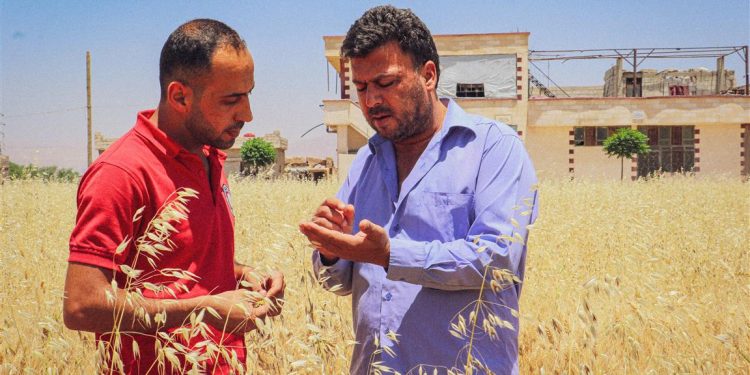One hour away from home took seven years for Abo-Khalil to back home
The distance from Nashabieh to Ma’araba villages, in Rural Damascus, takes an hour by car, but Abo-Khalil had to wait 7 years before being able to cut it back home. The man and his family had to suffer long years of displacement and were about to lose hope of getting back home.
“There is a huge difference between being displaced and being at your own home and land. It is incomparable even if you were forced to move a few kilometers far from your home,” said Abo-Khalil, who experienced the severe impact of the Syrian crisis, and had dispensed with his 10 brothers far and wide.
“It is a real happiness, it is something like a dream we realized when we were about to lose hope,” said Abo-Khalil expressing his feeling once back home. Today, after four years of being back home, things have become better. They started farming the land (9 Dunums) and installed a solar system to operate the water well. Then, they received the seeds and fertilizer grant from the Syrian Arab Red Crescent.
“I had to borrow the money needed to buy the solar panels, but it is better than buying the costly diesel. In addition, the SARC’s grant was such great support to us. We could use the money needed to buy seeds and fertilizers in meeting other basic needs.”
Compared to their high cost, farming activities’ returns are not enough to cover all the family’s needs, which consists of 60 members. They have to look for
other sources of income, but never giving up the occupation they inherited from their father.
“For me, it is fairly enough to be together with my family in one place. Returning home, even to a tent, was a dream. Losing home means you lost everything. My tears have never assuaged during the 7 years of displacement,” said the mother of Abo-Khalil. She is the happiest person being back home. Holding a lovely bunch of rosemary, she told how her family’s life changed: “Today, we eat the vegetables we grow, and drink water from our own well. We don’t have to buy water or pay rent as we had to do during displacement.”
The family of Abo-Khalil is an example of 150 families receiving the seeds grants that are supported by the ICRC. The grants are planned to help farmers regain their agriculture activities and enhance their livelihoods.
In 2021, the seeds grants, dedicated to the most vulnerable families, have reached 46,000 families in Syria.


